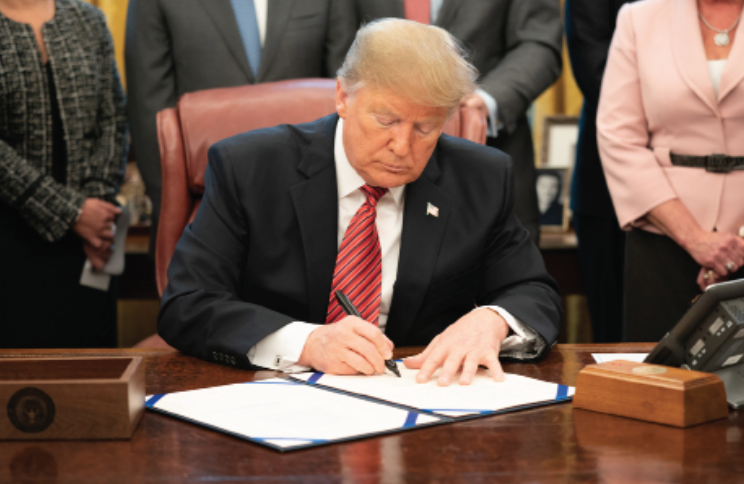
Sean Mickalitis
News Editor
Last Friday, Feb. 8, President Donald Trump declared a national emergency citing a “humanitarian crisis” along the southern border. Professors and students reacted to Trump’s declaration for increased security along the border and the redirection of funds to build a wall.
“We’re talking about an invasion of our country with drugs, with human traffickers, with all types of criminals and gangs,” said Trump, as he addressed the White House Press Corps from the Rose Garden in Washington, D.C.
In a statement from the White House, the president said additional security is needed at the border, and to address the issue, the nation would require assistance from the Army, Navy, and Air Force.
“If you’re going to have drugs pouring across the border, if you’re going to have human traffickers pouring across the border in areas where we have no protection, in areas where we don’t have a barrier, then [it’s] very hard to make America great again,” Trump said in his address.
Across the nation, politicians are weighing-in on Trump’s declaration, and so are faculty and students.
“President Trump’s decision to declare a national emergency to fund the border wall, by his own admissions, was to speed up construction and not out of necessity. The Founding Fathers separated the three branches for a reason, namely to avoid one branch from tyrannizing over the others,” said Political Science professor Dr. Kimberly Adams.
In his address at the Rose Garden, Trump said that presidents have declared national emergencies in the past and that Obama signed a declaration which dealt with cartels.
Since 1976, the National Emergencies Act was declared nearly 60 times, according to a statement from the White House.
“The declaration is a pitiful attempt to fund an unnecessary venture. I absolutely disagree with this decision for a couple of reasons. As the daughter of two immigrants, I find it disturbing that people are being persecuted for trying to escape violence and unstable governments in their home countries,” said ESU alumni and graduate student Daisy Hernandez.
“As of yesterday, 16 states have moved to sue the president over the declaration. I’m surprised it’s not more especially since Trump publicly admitted that there was no need to declare an [national] emergency. He just wanted to get it done faster, that’s all,” Hernandez said.
Some states have decided to take legal action against Trump because of the potential redistribution of funds.
According to a press release, California Governor Gavin Newsom released a statement the same day Trump declared a national emergency. Newsom said the declaration would redirect money the state uses for law enforcement and narcotics operations to fund projects along the border.
“Our message back to the White House is simple and clear: California will see you in court,” Newsom said according to a press release.
According to a White House statement, the Homeland Security appropriations bill has provided $1.375 billion to fund construction of the border wall, but that was not enough.
Now, with the declaration of a national emergency, the Trump Administration can acquire $601 million from the Treasury, up to $2.5 billion from the Department of Defense (DOD) to support counterdrug activities and $3.6 billion from the DOD to fund military construction projects, according to a statement from the White House.
“…taking money that has been appropriated by Congress to other governmental agencies to help fund the wall, could leave those agencies ill-equipped to fund military construction projects and to fight drug trafficking in the U.S. This ‘power grab’ could set a dangerous precedent that could come back to haunt the Republican Party when a Democrat is elected president,” Adams said.
Hernandez and her parents, who are immigrants from Honduras, are worried about the social state of the country under the Trump Administration.
“…my family is concerned that with President Trump at the helm of this country, we’re facing a national decline. People feel more comfortable being blatantly racist and sexist because of the President’s comments and past actions. Everyone in my family is lucky enough to be a citizen, so facing deportation isn’t generally a concern,” Hernandez said.
Hernandez also expressed that she and her family are worried about generalizations others may make because of her Hispanic ethnicity because of past racial remarks made by Trump.
She also said she would rather see the money be used to enrich neighborhoods or create after-school programs rather than build a wall that will not stop drugs or gangs from entering the country.
Adams does not believe the wall will be useful because there is no way to keep determined migrants from creating better lives for themselves.
“When people are fleeing oppressive governmental regimes, poverty and gang violence in their home countries, I doubt that a wall will be a deterrent,” Adams said.
Email Sean at:
smickaliti@live.esu.edu

